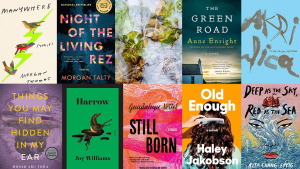Each summer, the editors and staff from the Kenyon Review pool their literary prowess — and killer taste — to offer book recommendations perfect for the longest days of the year. Whether looking for a new beach read or a challenging tome, this list has options sure to satisfy. Read on to find recommendations from every genre, sure to pique the interest of anyone longing to sink their teeth into a good summer book.
Nicole Terez Dutton, Editor
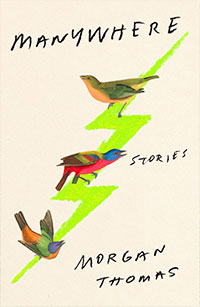
This year has brought us an array of incredible books, and narrowing all the greatness down a list of summer reading recommendations is no easy task. Here, then, are a few books that I’ve recently read that both held me spellbound while I read them and then managed to stay present in my thoughts for the days and weeks following. They are, in Toni Morrison’s words, friends of my mind.
Jamil Jan Kochai’s "The Haunting of Hajji Hotak and Other Stories" is a gorgeous, astonishing collection of stories. Short listed for the National Book Award last year and including a story that received one of this year’s O. Henry Prizes, this book has been praised for its range and electricity. It is utterly electric and completely absorbing.
Morgan Thomas’s "Manywhere" is another kaleidoscopic collection of smart, vivid short stories, this one deeply rooted in the American South. Thomas’s titular short story “Manywhere” appeared in the Kenyon Review in 2021.
"South to America," Imani Perry’s most recent book, places the author’s own lived experience within a larger historical context so that we might (re)consider the complexities of the American South, our habitual difficulties in framing a conversation that properly acknowledges its contradiction and variety, substance and character.
"The Great Reclamation" by Rachel Heng is a sprawling love story. The sensuality of the sentence-level music alone makes this book an extraordinary experience, but then there is nothing in this book that isn’t challenging and exquisite.
Sally Wen Mao’s third book of poetry, "The Kingdom of Surfaces," is also relentless and clear eyed in its investigations of history, perception, violence, art. Ama Codjoe’s "The Bluest Nude" is a book of poems as intimately concerned about visual art as it is about the act of looking. It is a remarkable, searching debut.
Lastly, "Love Child’s Hotbed of Occasional Poetry" by Nikky Finny, which is not new, but a book that seems to me so beautifully realized a project that it bears mention here. It is as ambitious as it is generous, and offers a dazzlingly rigorous approach to personal archive.
Geeta Kothari, Senior Editor
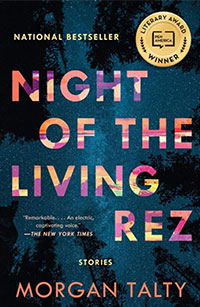
In Morgan Talty’s "Night of the Living Rez," the stories build on each other, not unlike a series of snapshots in a family album. Set on the Penobscot Reservation in Maine, the stories focus on David and his family, alternating between childhood and adult life, creating an immersive reading experience, much like reading a novel. What struck me most about Talty’s writing was the balance between humor and tragedy as he captures the struggles of those in David’s orbit. He writes with a great deal of tenderness towards even the most hapless individuals. Talty’s great gift is his ability to make the reader empathize with David and his friends even at their worst.
I’m also reading Alba De Cespedes’s 1952 novel, "Forbidden Notebook," translated from Italian by Anne Goldstein, and I don’t want it to end. The book reads like a painfully intimate private diary, forbidden not only because paper is rationed in post-WWII Italy but also because women aren’t expected to have a life separate from family. To her children and husband, Valeria exists solely as mother and wife. The idea that she might have an interior life is laughable, and so she keeps the diary hidden, writing in it only after everyone has gone to bed. Over time, she finds it increasingly difficult to ignore the fault lines — already visible to the reader — in her perfect family.
Orchid Tierney, Senior Editor

I highly recommend Dennis James Sweeney’s "You’re the Woods Too" (Essay Press, 2023), a mesmerizing hybrid travel diary/poetry collection that carries the reader through the theaters of nature. Lines like “An ocean hangs from the boat” and “When the right breath comes I will breathe it” show Sweeney’s wonderfully disorientating grasp on language. Dong Li’s "The Orange Tree" (University of Chicago Press, 2023) intimately weaves family history with political calamity through the experimental lyrical. Moments like “Life departs the face / Genealogy begins to pray” sucked me into the collection’s dramas. Lastly, Michael Walsh’s "Queer Nature: A Poetry Anthology" offers a rich variety of queer ecopoetry from the nineteenth (Emily Dickinson, Walt Whitman) to twenty-first century (Meg Day, Julian Talamatez Brolaski, Brian Teare). I loved how I could dive in and out of this collection and encounter something new each time.
Katharine Weber, Senior Editor
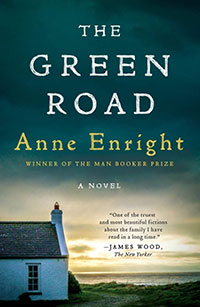
Anne Enright is an Irish novelist whose shimmering prose is utterly beguiling, sentence to sentence. Her plots are as twisty and delicious as the best sort of gossip, and there is a boldness to her choices of words, situations, shifts in the weather both actual and emotional. "The Green Road" is in some ways a very familiar sort of novel for readers of contemporary Irish fiction—here we go again, a multigenerational Irish family in conflict. But that is not to say her vivid and surprising storytelling is anything but shockingly original. If you’re not familiar with any of her books — though she’s won all sorts of significant prizes and honors — then it’s high time to catch up, and "The Green Road," published in 2015, is a perfect place to start. You will want to read so many sentences aloud you could start your own family conflicts.
Kathleen Aguero, Reader
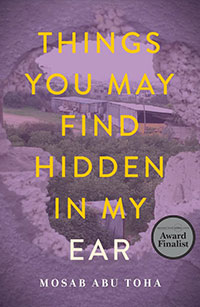
In Mosab Abu Toha’s debut collection of poetry, "Things You May Find Hidden in My Ear," this Palestinian poet from Gaza exhorts “Don’t think of us as numbers.” Writing as both witness and poet, he makes it impossible to see the inhabitants of this contested land as anything but individuals whose lives are continually disrupted and threatened: “In Gaza, / breathing is a task, / smiling is performing / plastic surgery / on one’s own face.” Yet there is joy and freedom in writing: “The poem is free. / It lands in a nest of migratory birds. / They sing it to the passing clouds.” Anne-Marie Oomen’s "As Long as I Know You: The Mom Book" explores a daughter’s role as caretaker, along with her siblings, for a mother with whom she has always had a conflicted relationship: “I was a child of will and she was the mother of no.” With unflinching honesty and exquisite lyricism, she writes of coming to terms with their history. Together they work on a puzzle: “We are putting the whole picture together as best we can. You reach for the puzzle pieces, and after a long and perilous struggle, your fingers brailling over the edges, you put them together. They are not made for each other, but they do hold.”
Jamie Lyn Smith, Reader
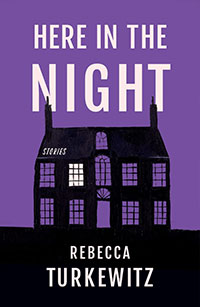
Rebecca Turkewitz’s forthcoming short story collection, "Here in the Night" tops my list of summer recommendations. What could be more fun than queer, quirky literary horror fiction? Turkewitz’s powerful stories sing with an eerieness and insight that haunts this reader. Mariana Enriquez’s "Our Share of Night" is absolutely enthralling story about possession, the bonds of fate and family. Lush language and a sweeping, gothic plot kept me under its spell. Nana Kwame Adjei-Brenyah’s "Chain-Gang All-Stars" is sweeping all the “must read” lists for good reason. By turns hilarious and provocative, Adjei-Brenyah’s searing exploration of the heart and its search for freedom in an insidious system was mesmerizing and moving. Stacy Jane Grover’s "Tar Hollow Trans: Essays" is a powerful exploration of rural Appalachian Queer experience, in lyrical and probing prose that sings with joy while interrogating memory, history, and cultural traditions.
Elinam Agbo, Kenyon Review Fellow
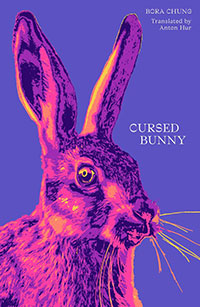
I’ve been obsessed with Bora Chung’s "Cursed Bunny" (translated by Anton Hur) ever since I read the first story, “The Head,” an uncanny tale about a woman and a head — born of the woman’s waste — that pops out of the toilet and calls her “Mother.” Like this “Mother,” many of Chung’s female characters are haunted by manifestations of societal expectation, whether that may be doctors insisting a woman must find a husband to deliver a healthy baby (“The Embodiment”) or neighbors who place obstacle after obstacle in a new homeowner’s path (“Home Sweet Home”). With its unflinching exploration of inherited ghosts, cursed objects, the burdens of capitalism, and maternal responsibility, Cursed Bunny has become one of my favorite collections of all time. I encourage you to read these stories (especially the titular story) out loud, and if you are particularly daring, listen to them in the dark, with a flashlight and a friend.
Another uncanny book I’ve loved this year is Gerardo Sámano Córdova’s debut novel "Monstrilio," which begins when a grieving mother cuts out a piece of her dead son’s lung, feeding it until the lung becomes the protagonist Monstrilio (or M). The rest of the story is at once bloody and tender, following a family that loves M dearly, individuals who are bound by their desire to keep him in their lives.
I’m also excited about Nishanth Injam’s forthcoming debut "The Best Possible Experience," a beautifully devastating collection, populated by characters in rural India and in diaspora, filled with loss, longing, and fraught homecomings. The book opens with “The Bus,” in which a young man on his way to visit his parents finds that his fellow passengers are disappearing into the bathroom. As he contemplates his own impending demise, the narrator (the young man in question) addresses his dead brother — a brilliantly executed shift in narration that propels us to the story’s inevitable end. The stories that follow, while more realist, are no less haunting — I especially loved “Come with Me,” “Summers of Waiting,” “The Math of Living,” and “The Zamindar’s Watch.”
Jackson Saul, Managing Editor
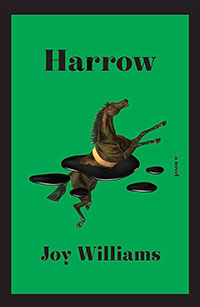
The recent death of a public figure prompted me to return to Joy Williams’s various works to do with environmental terror — her essay “Cabin Cabin” and novels "Harrow" and "The Quick and the Dead." I looked most forward to "Harrow," her latest, about a Christlike teen who convenes with a band of existential elderly people plotting their martyrly final acts. However, a passage near the book’s beginning sent me away from re-reading and back into the woods: “the world is dying because we were dead to its astonishments pretty much. It’ll be around but it will become less and less until it’s finally compatible with our feelings for it.”
David Baker, Workshop Instructor and Natures' Nature Editor
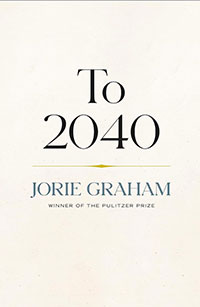
Already 2023 has brought several fine new collections of poems, by Colin Channer, Monica Youn and especially Jorie Graham with her latest, "To 2040." Graham’s is a truly great book, by my reckoning, as full of peril as discovery, of lyrical depth as of brilliant thinking. The circumstances may be dire, both for the gasping planet and the cancer-stricken speaker, but Graham constructs a space for wonder and newness as well as elegy and alarm. “I am just shaking you gently to remind you,” she nudges; and then, presenting in the declarative voice what might typically be a question: “Do you want the results.” Of course we don’t; of course we do. Graham has never been more flexible — in line, syntax, form, landscape — than here in "To 2040." Her poems in their journeys and their findings go where no one else’s can go.
Han Kang’s "Greek Lessons" is a marvel of story and style. It’s not a long novel but feels as complex and deliberative as one, and its intense interiority — and its shifting scheme of voices and time periods — amplifies its rigor. The two primary characters — a German professor of classical Greek, losing his sight, and an adult student, a Korean woman who has stopped talking altogether—feel their ways slowly across complex cities but also toward each other. I should add there’s a third “character” here, and that is the slippery figure of language — or languages, including ancient Greek, German, Korean, and the idioms of memory, trauma, and desire. This third character may represent the “middle voice”; part of the grammar lesson of the book, it’s neither active nor passive but situated as a nexus between the other two figures. It works like fate, this middle voice, or a touch of magic beyond our ability to see and to speak.
Dan Beachy-Quick, Workshop Instructor

There is a book, a major work by a major poet, that I’ve been wanting to put in everyone’s hands — no, that’s a lie. Not everyone’s hands, but the hands of certain someone’s — those I love, those I trust most with the odd wonder-thing poetry is — and that book is Ann Lauterbach’s "Door." She is one of this country’s primary poets of actual attention. By that I do not mean attention as ascetic discipline, nor attention as singular focus. I mean something more exalted and far rarer: “Attention is a form of response, not just / perception. If you attend, you respond; / otherwise you are in an aesthetic morality, pleased with yourself for seeing.” In these poems, attention is a primary ethos, a nearly Orphic calling out to the world which is itself a calling world in. The self is a strange penetralium — a psyche and a soul, a permeable boundary, where mutuality is a fundamental law, and thinking participates in the ongoing creation of the world, as much as the world participates in the ongoing creation of thought. I can hardly think of a poet more invested in the possibility of, well, the possible. She’s one of the few who senses that “Under this alphabet there is another, recessed, / entangled, its charge curved into / rings of hair, rings of bone, its vocabulary remote.” A poem in search of an alphabet discovers this command: “Learn again to speak.” If there is a definition of poetic courage, it may be in trying to follow that command. So graciously and for so long, Ann Lauterbach has done so, has “learned again to speak.” The world, and the reader-in-the-world (is there any other kind of reader?) or far the richer for it.
Victoria Chang, Workshop Instructor
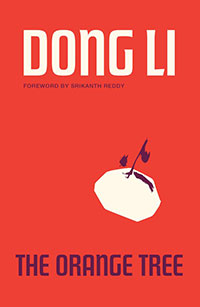
I am reading so many books at once that I’d love to list them all here. But I’ll just list the few that are on my desk at the moment:
Dong Li: "The Orange Tree." This is an interesting book of poems, published earlier this year by the University of Chicago Press. Narrative propels the poems forward, generally, but there’s an occasional strangeness that rattles my ear. I also love poems that rely heavily on imagery.
Nelly Sachs, translated by Joshua Weiner: "Flight and Metamorphosis" (FSG, 2022). This is a book of poems published in 2022 that I’ve been carrying around with me. I’ve read these poems a few times already, slowly. The capacious thinking in the poems interest me. Here’s a first stanza of a poem:
How light
the earth will be
just a cloud of evening’s love
when the stone, released as music,
flees the land…
Matthew Zapruder: "Story of a Poem. "This is a memoir published by Unnamed Press in 2023, and one that I finished a little while ago, but I’m still thinking about. I think Zapruder is such a skilled prose writer — his prose is clean and easy to understand, but the emotions underneath the prose are complex. This book is interesting to me because it ties together two complicated narratives about trying to write poems and being a parent of a neurodivergent child. It has a kind of braiding effect. This book, to me at least, seems so much about the process of growing and changing in the face of life’s challenges.
Forrest Gander: "Knot" (Copper Canyon Press, 2023). I first heard Gander read these poems last week at an event. I was immediately attracted to the big philosophical questions these poems seem to be grappling with. These are poems that seem to traverse the ridges of a thinking mind. The book also includes photos of the poet by Jack Shear.
Alejandra Pizarnik, translated by Yvette Siegert: "Extracting the Stone of Madness, Poems 1962–1972" (New Directions Press, 2000). This book contains the middle and late work of Pizarnik, a poet I just recently learned about. Here’s a part of a short poem called “Dusk:"
The shadow covers the outer petals
The wind makes off with the final gestures of leaves
The foreign, now twice-silenced sea
inside a summer pitied for its lights…
Danez Smith, "Homie" (Graywolf Press, 2020): This book came out a while ago but it’s on my desk because I am editing a talk on joy in poetry. I’ve always loved Smith’s poems for their sonic qualities, their rhythmic abundance and prowess. Revisiting this book reminds me how much I enjoy reading Smith’s poetry.
Laura Lampton Scott, Young Writers Instructor
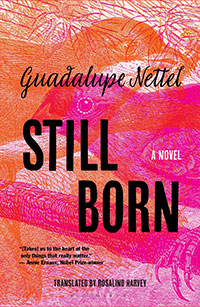
More than any summer before, I’ve been directing my free time to reading books that I rushed to buy as soon as they were released. Two books that came out recently and were well worth the wait: "The Lost Journals of Sacajewea" by Debra Magpie Earling and "Ink Blood Sister Scribe" by Emma Törzs. Both writers wield language like witches, conjurers, one calling forth the lost voice of one of our most unvoiced and famous historical figures. Earling’s language forms its own worldview, a diction outside of male colonization. Törzs weaves a tale full of mirror magic and bottomless sisterly love with gorgeous prose worthy of all the hype. Another summer release to look forward to is a translation from the singular Guadalupe Nettel, whose work I’ve loved since her spare and precise debut "The Body Where I Was Born." This new release, "Still Born," approaches the assumption of motherhood upon women from unflinching angles, asking the reader to experience the sometimes wonderful and sometimes brutal work of caring for and raising children, healthy or fatally ill, one’s own children or those in need of caring. From the to-be-read pile, I recently got to last year’s "Post-Traumatic" by Chantal V. Johnson, the most accurate portrayal of the dark humor and intense feeling that comes along with surviving trauma, and the overturning of one’s worldview once one becomes aware of the maze of coping patterns required to survive trauma. Currently, I’m reading the heartrending, loving memoir of family and addiction that is "Meet Me Tonight In Atlantic City" by Jane Wong. And then, a dark tome I’ve been saving for long, empty summer days: the latest translation from the Argentenian master of uncanny commentary on our precarious present, Mariana Enriquez’s "Our Share of the Night." Here’s hoping your summer is packed with pages and pages of wonder.
Kelsi Vanada, Online Workshop Instructor
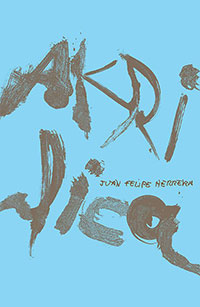
Last year, Noemi Press published a new English translation of "Akrílica," the groundbreaking, bilingual 1989 book by Chicano writer and United States Poet Laureate Emeritus Juan Felipe Herrera. Farid Matuk, Carmen Giménez and Anthony Cody served as the volume’s editors. They translated many of the poems themselves, forming a collective to join them. The editors write, “'Akrílica' was translated both individually and collectively with the vision of honoring the original text, but also its jubilant energy towards the new, the contemporary.” This new volume is a hybrid bilingual masterpiece, incorporating visual art by Herrera as well as photographs from the artistic and activist milieu in which he was writing the Spanish original poems in the Bay Area in the late ’70s and early ’80s. It’s amazing how this team of translators brings this seminal experimental work into English for their new political and cultural moment.
Gina Chung, Peter Taylor Fellow
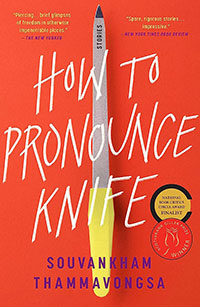
"How to Pronounce Knife" is a stirring and continually surprising collection of stories that completely upended my expectations of what a short story should be or can do. Souvankham Thammavongsa’s explorations of the lives of Lao immigrants are deeply felt, and her characters — a housewife enamored with Randy Travis, a failed boxer painting nails at his sister’s salon, a father who can predict a couple’s marital happiness by the attention paid to their wedding invitations, an accountant whose all-black wardrobe and fierce independence hide her desire for connection, among many indelible others — feel totally and completely alive in all their quirks and complexities. Told in a clean, bracing prose style that cuts as clean as the knife evoked by the title, this collection pierced me through the heart and left me all the better for it.
Amy Estes, Peter Taylor Fellow
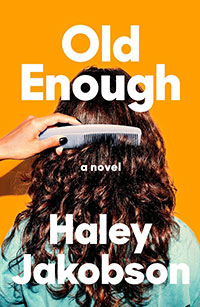
I stayed up late last week blazing through Haley Jakobson’s novel "Old Enough." The story follows Sav, a college sophomore, as she is coming into her own as a newly-out bisexual woman who is finding queer community on her college campus. Meanwhile, her childhood best friend, Izzie, is getting married and reminding Sav of what she left behind, both good and bad. This book handles sexual assault and its aftermath incredibly well and very realistically, unflinchingly diving in to what it means to recover and to heal, while acknowledging the complexities of that trauma. Jakobson’s portrayal of queer community, the messiness of finding yourself, and the power of friendship with others and your own self is so beautifully written, and the accuracy and compassion with which she writes about coming out, the desire for queer friendship, and the chaos of it all is funny and poignant. A fantastic summer read that will stick with you!
Lilia Shrayfer, Peter Taylor Fellow
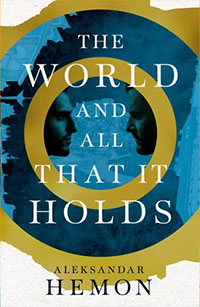
I picked up "The World and All That It Holds" by Aleksandar Hemon because of my ongoing, somewhat melancholy interest in tales of displacement. These stories always seem to me a testament to the wise words of Faulkner: “The past is never dead. It’s not even past.” For some reason, it’s life-affirming to read books about people haunted by the terrible things I’m haunted by.
But what kept me reading Hemon’s latest novel, a journey of survival and love between a Sefardi pharmacist named Pinto and a Bosnian soldier named Osman amidst World War I, is its defiant nature. It’s a clear work without making clarity its primary virtue, which can be tempting with highly complex plots like Hemon’s. We move in and out of third- and first-person voices, we cross languages without being offered translation, we swim in memories within memories — or within daydreams? The novel often reads like a prayer Pinto must tell himself, then and now, in his search for a life on the other side of exile: "The Holy one kept creating worlds and destroying them, creating worlds and destroying them, over and over…"
Just this past month, when I was a fellow in E.J. Levy’s Fiction course at the Kenyon Review Writers’ Workshop, a participant’s work reminded me of the prose of Italo Calvino. I’m talking about when the exposition — the telling — offers the illusion of showing, when what we are told cuts to the bone, appeals to the senses with its freshness. I think readers will find that kind of lush density here in Hemon’s novel, which I suspect will be most enjoyed by readers who read not only for pleasure but to cultivate a kind of patience, for, as Hemon calls it, “the world and all that it holds.”
Angela Siew, Peter Taylor Fellow
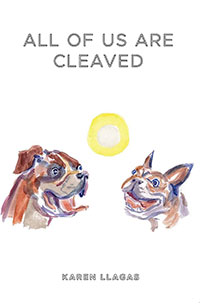
In "Analog Poet Blues," I love Yeva Johnson’s open heart, her willingness to define and redefine herself through race, gender, faith and sexuality as she and her environment change around her.
Lines like “I shared my belief that at least one person in the universe / could understand, accept, and love me all at the same time / when I confessed my hope that it might be you” or “I am not your black lesbian unicorn / I am not your family doctor, nor am I / your muse” speak to me intimately. I trust and want to know more whether in Brazil or San Francisco, through search for romance and the discovery of queer eros, songs of self-celebration or the struggles of an analog poet in a digital world.
In "All of Us Are Cleaved," I love Karen Llagas’s grace and her ability to sing the poetry of the everyday in narratives of family, migration and political engagement. Lines like “Your name / which means sunlight opened mine, / which means wound” and “If I can’t name what’s lost how / can I emerge from mourning?” challenge me to question what endures. I lament and find pleasure with the speaker in her homeland of the Philippines, in her marriage, remembrance of her mother/grandmother/ancestors, her movements between the Philippines and the US and during a global pandemic.
Both poetry chapbooks, released from Nomadic Press earlier this year, are rich, wonderful reads.
Holly M. Wendt, Peter Taylor Fellow
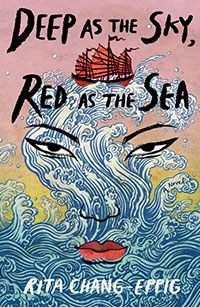
I have been especially entranced by two novels this summer that take very different approaches to writing in the spaces both created and elided by history: "Deep as the Sky, Red as the Sea" by Rita Chang-Eppig and "Lavinia" by Ursula K. Le Guin. Deep as the Sky, Red as the Sea imagines the pirate career of Shek Yeung, a woman who controlled one of the most formidable fleets in the South China Sea. While the dangers of such a life — violence, sea storms, power struggles — animate the novel in expected ways, the interplay between Shek Yeung’s narrative present and several interstitial stories of the goddess of the sea provides another tension rich in implication and metaphor and a touch of metafictional awareness.
Le Guin’s titular narrator is both a storyteller herself and a pawn in the story someone else is telling. Lavinia shares her own experiences as she meets Aeneas, the refugee Trojan prince who will be her husband, but she does so in full knowledge of all that is to come; she is in open conversation with Virgil’s "Aeneid" and, in fact, with Virgil himself.
Both novels offer engrossing stories, but more than that, they provide enticing ways of telling their stories that open up possibilities for our own.
Emmaline Rogers, Summer Adult Programs Assistant
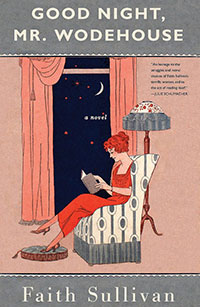
"Good Night, Mr. Wodehouse" by Faith Sullivanis my idea of the perfect beach read. I picked up my copy from Sundog Books the last time I was near the ocean: during spring break of my junior year of high school five years ago, when the water was cold and the waves too rambunctious for swimming. After a semester and a half of soul-draining college prep, this slow-paced book was the perfect reminder that there is more to life than test scores and embossed diplomas. Sullivan traces the life of a housewife at the start of the twentieth century, running her fingers over the themes of a woman’s independence and deep strength as her character navigates single motherhood, her own sexuality, and the aftermath of the first World War. She begins the novel with her character’s obituary, which the character wrote herself, then starts the narrative sixty years earlier, setting you up to witness the character’s transformation. I read it in the beach house loft while a storm rattled the windows, then again in early 2021 when I needed the same reminder again. It’s a book that holds up, and will withstand many a read in the darker of times.
Kat Ellis, Young Writers Program Assistant
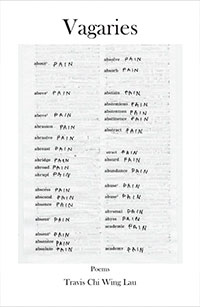
This summer, I am rereading one of my favorite fantasy series growing up: Jodi Lynn Anderson’s "May Bird." Without spoiling too much of the plot, a ten-year-old, timid May Bird falls into a lake and enters the Ever After, a world of ghosts. There, she must find a way back home to her mom, and to her best friend (her cat), Somber Kitty. May does not make a particularly obvious hero — she has many insecurities and often doubts herself — but she does not give up. I would recommend this series to anyone, but especially to those with a soft spot for creative stories of living in girlhood and falling out of it. Also, Somber Kitty is the best fictional cat ever.
For poetry, I recommend Travis Chi-Wing Lau’s "Vagaries," which, like much of Lau’s poetry, beautifully communicates the frustration of aching for intimacy and being constrained by chronic, physical pain. Lau’s care for diction only enhances the longing in his voice, which carries without breaking from the first to last page.
Olivia Testa, Writers Workshop Support Staff
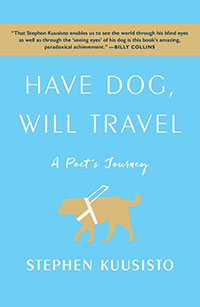
Stephen Kuusisto’s "Have Dog, Will Travel" explores what life is like when you no longer have one of your basic senses: sight. After being forced to hide his disability as a child, Stephen Kuusisto recounts his relationship with his seeing eye dog Corky and how he helped Kuusisto become more confident in his stride. The memoir really had me in my feelings when I read it during the school year, and now that I have some more free time I want to read it again so I can really soak up all its brilliance!
Kenyon Spotted In
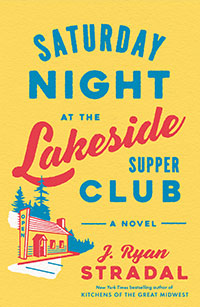
When New York Times bestselling author and Minnesota native J. Ryan Stradal chose a college for one of his characters to attend, he chose wisely. In "Saturday Night at the Lakeside Supper Club," his fictional tribute to Midwestern supper clubs and the generations of families who inherit them, Stradal dedicates a few pivotal pages to Kenyon, writing about Gambier with such reverence that alumni may wonder if he’s a graduate himself. While Stradal did not go to Kenyon, he is a fan of those who did, saying: “I like the Kenyon grads I’ve met over the years — it sounded perfect for my character, who’s a wildly intelligent, iconoclastic Midwesterner who wanted to go to a smaller, academically rigorous college in a peaceful, bucolic environment.”
Here is a spoiler-free excerpt:
“The experience of being a college student at Kenyon was even better than she’d imagined. She loved a program called Outdoors Pre-O, where she explored an unfamiliar wilderness with more new friends. And almost every weekend until it snowed, she biked the Gap Trail. The strong trees and early chill reminded her of Minnesota. As her grandmother would have put it, it was her church away from church.”
From "Saturday Night at the Lakeside Supper Club," by J. Ryan Stradal, published by Pamela Dorman Books, an imprint of the Penguin Publishing Group, a division of Penguin Random House LLC. Copyright © 2023 by J. Ryan Stradal.
